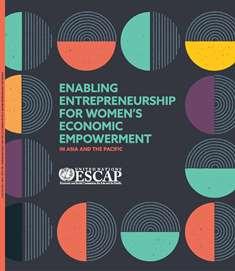Such findings corroborate those of Women, Business and the Law, a World Bank Group project identifying the laws and regulations that affect women’s economic opportunity in 190 countries. In 2022, Women, Business and the Law found that a typical woman in East Asia and the Pacific has less than three-quarters of the rights of men in the areas measured. Persistent gaps remain, for example, in adopting leave policies that can affect women’s work after having children, protecting women from sexual harassment in employment, and preventing inequalities in access to credit. Out of 25 countries in the region, 17 do not prohibit discrimination based on gender in financial services, freely allowing lenders to discriminate against women who are trying to start a business and earn a living. As confirmed by the East Asia and Pacific Gender Innovation Lab, a gender lens should be applied to all micro, small, and medium enterprise (MSME) policies to ensure equitable access for women. In fact, a more equal legal environment is associated with a higher share of female entrepreneurs.
To turn this data into action, the ESCAP Catalyzing Women’s Entrepreneurship Programme (CWE) is working directly with countries on policy and governance initiatives to create an enabling ecosystem, enhance access and use of financial services, and strengthen use of technology and digital solutions for female businessowners. In Viet Nam, for instance, CWE undertook a comprehensive review of the SME Law to assess opportunities and gaps in its scope and implementation. As a result, several recommendations related to women entrepreneurs were incorporated, including important stipulations on incubation, human resource development, financial services and counselling support. Programs in Bangladesh, Cambodia, Fiji, Nepal and Samoa are also ongoing to make the policy and institutional environment more gender-responsive and advance women’s economic empowerment.
Taking the opportunity to further examine relevant data and build on the success of these initiatives, the World Bank Group and ESCAP together recently hosted a regional dialogue titled “Enabling Women’s Entrepreneurship through Smart Legislative and Policy Reforms”. The event, attended by more than 100 participants, focused on the legal and regulatory challenges facing women entrepreneurs in the region, presented case studies of successful reforms, and identified strategies for the way forward. In her opening remarks, World Bank Group Global Director for Gender, Hana Brixi, emphasized the need to “draw on everyone’s experiences and work together to prioritize women as the essential drivers of economic growth that they are.”
Sessions included an overview of relevant legal and economic research, a presentation of positive policy reforms, and a panel discussion of experts on gender equality and women’s entrepreneurship. The panelists’ insights ranged from resilience measures and legal reforms needed for female entrepreneurs in Pakistan, to hearing from women entrepreneurs in the Suva Flea Market about the urgency of interventions needed. They highlighted positive experiences of collaboration between private sector startups and governments, such as in Bangladesh to create a women entrepreneur hub, and presented innovative instruments that support scaling up access to finance.
Breakout sessions also allowed for a free-flowing discussion of key policy solutions that can boost women’s entrepreneurship and advance gender equality. Participants agreed that some initiatives are vital to improve women’s economic opportunity. For example:
- The adoption of data management frameworks to improve governments’ capacity to collect and analyze sex-disaggregated data related to women’s entrepreneurship.
- Gender-responsive procurement plans to increase political commitments to women-led MSMEs.
- Governments can lead and facilitate access to markets and networks for women entrepreneurs.
- Integrated support systems, with targeted programs aimed at providing digital literacy and facilitating legal certification for women entrepreneurs.
- Grants, trade guarantees and partnerships with banks to help bridge gaps in access to finance.
- Women-centric measures in laws and policies to disable discrimination toward female entrepreneurs in the region.
Together, we can continue to share lessons around legal inequalities, advance concrete solutions for female entrepreneurs, and put gender equality at the top of policymakers’ reform agendas. As Kaveh Zahedi, the Deputy Executive Secretary of ESCAP said in his address, “Our support is based on a conviction that if countries are to successfully rebuild after the pandemic, women must flourish as decisionmakers and as businesspersons. No country can afford to forego advancing gender equality that could add as much as $4.5 trillion annually to the region’s GDP. The time to act is now.”













Add new comment